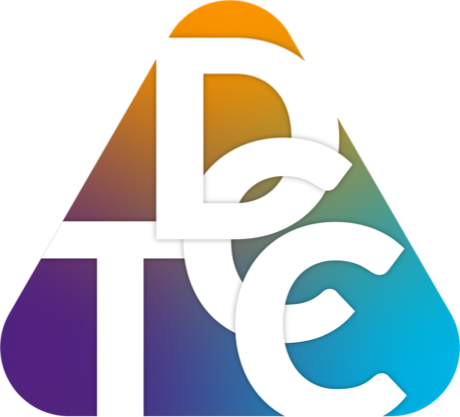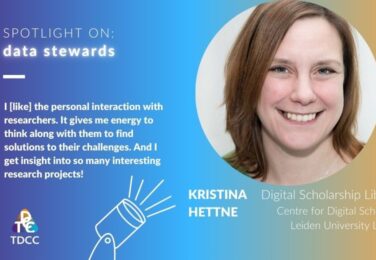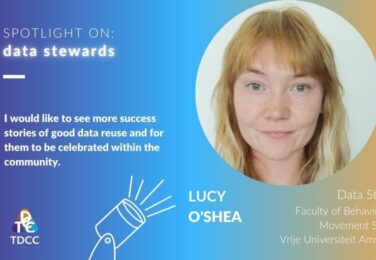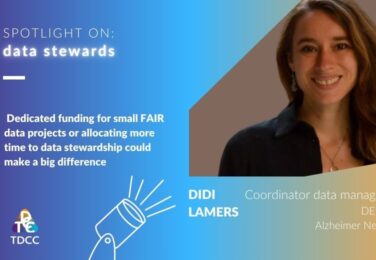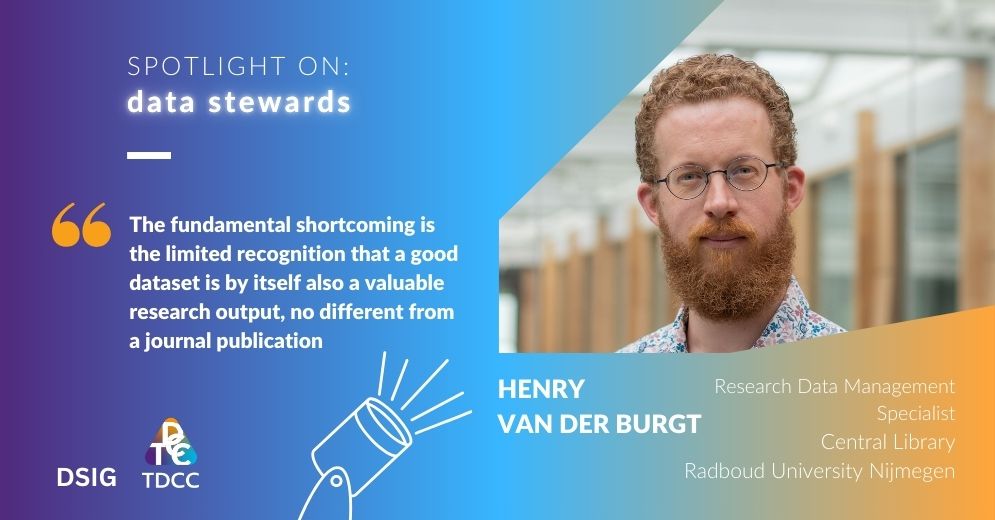
Spotlight on: Henry van der Burgt
Every other week, the Thematic DCCs and the Data Steward Interest Group (DSIG) put the spotlight on one research data steward working in the Netherlands to stimulate knowledge exchange and peer-to-peer learning.
What drew you towards the research data management field?
I already had a passion for academic research for a long time, and it started at Radboud University by doing research myself. One thing I struggled with, however, was the narrow scope that comes with an individual research project. It is easy to lose sight of the "big picture" and to see the amazing things that researchers in other research fields are doing. That is what ultimately pulled me to a support role in the research data management field. Here, I enjoy the combination of a broad perspective on academic research, the opportunity to keep abreast of the latest developments in the rapidly developing field of RDM, and the insightful interactions with researchers who are looking for solid advice on how to manage their data.
What is an activity/task of your role that you find yourself looking forward to?
Two activities in fact! One is deep diving into a new topic that previously I knew little or nothing about, e.g. how to optimise for FAIR qualitative research, data organisation, anonymisation of research data. This is an opportunity to survey the land, to see what knowledge, recommended practices and good ideas are already out there. I particularly like the challenge of combining different sources into a coherent publication or presentation about a topic, I suppose it calls back to my early days as a student of History. The other is to share these findings with the researcher community, whether that is in conversation with researchers, on Zenodo, or in the RDM workshops that we organise university-wide.
What is something unexpected that you can offer help with, if a colleague reaches out to you?
I obtained a PhD in the social sciences, in particular anthropology. So I have some experience with sensitive and qualitative research data and the challenges that arise when researchers are dealing with personal data, anonymisation and vulnerable participants. Currently, the use and re-use of this data is often limited by various constraints, as researchers justifiably seek to protect their participants and their personal data gathering efforts. Yet, at the same time, there are strong arguments for why this data could and should be made more open. Obviously, this requires a well-designed approach that would make it possible to share this data with sufficient safeguards for the interests of participants. I am by no means an expert, but I do find it a very interesting dilemma for which I think we will see more and more creative solutions in the future.
What do you think your community of research data professionals is missing?
In my view, the fundamental shortcoming is the limited recognition that a good dataset is by itself also a valuable research output, no different from a journal publication. While the value of data is increasingly recognised at the level of academic policy, the uptake in the actual research practise is less expedient. Yet, I believe that this change of perspective would open up a lot of opportunities, starting with the introduction of good research data management practices in the academic education that universities offer. If students are trained in the best data management practices, they will also develop into better researchers, who in turn will also proceed to teach future generations. I am very excited to see Radboud University engage more with this topic, creating fertile ground for something akin to "RDM for Students".
What is a topic you would want to collaborate on with others?
I think there are many topics that would benefit from cooperation between universities, but my personal favourite one would be the best and new methods, techniques and developments by which researchers can better work with qualitative research data in a FAIR manner, allowing greater transparency, re-use and collaboration.
Could you point us to a resource, learning platform, tool or similar which you find useful or inspirational?
One challenge that I identified early on in my career was the sheer number of events, activities and interesting workshops available to both research support staff and researchers. There are countless of these events, yet finding them across the many RDM-related calendars and websites and selecting the ones that are relevant was by itself a daunting task. For that reason, I came up with a DCC Calendar, a simple Outlook calendar in which we add a curated overview of the many interesting activities in the field of RDM, privacy, AI, high-performance computing and so on. Once a month, we send out an e-mail to interested datastewards and researchers, with an overview of the activities that are planned in the coming months. We find that this is a very accessible way to get a good overview of the upcoming activities, without the need to look up events yourself. And the nice thing is that we can also include colleagues from other research institutions, so feel free to sign up via dcc@ru.nl if you are interested in this!
Get in touch with Henry on LinkedIn | ORCID
Do you want to read other interviews published in the Spotlight on series? Visit the series' page.
Are you a data steward or data professional who wants to be featured in one of the future editions? Fill out this form.
